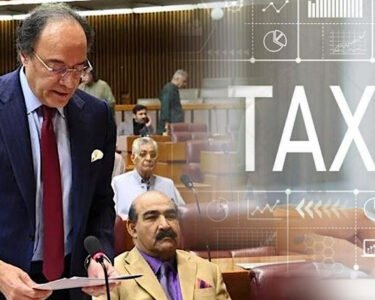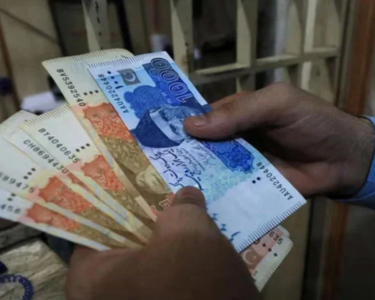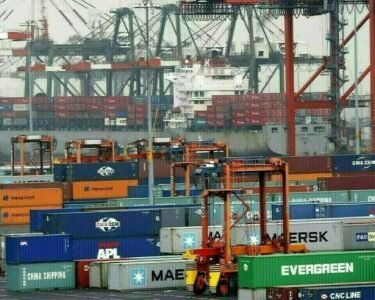Without undertaking any much-awaited reforms to slash the expenditure side, the government has come up with the prescription of taxing heavily in the budget for 2024-25, up to such an extent that was never witnessed in Pakistan’s history.
A detailed analysis of the budget documents for 2024-25 showed that the federal government hiked its expenditure side by 25 to 30 per cent on every front instead of cutting down unnecessary spending and was still relying upon promises and commitments to move towards the desired objectives. It seems that only books were balanced to achieve a sole objective, which is clinching the IMF deal at all costs.
The budget 2024-25 lacks vision and direction and the message is simply loud and clear that the incumbent regime does not want to reduce its expenditure but ready to assume the driving seat to penalize fixed-income groups such as salaried class for increasing their income tax and slapping GST by removing all kind of exemptions. The GST is considered a highly inflationary tax that burdens the low-income earners at the consumption stage and hurts the poor more keeping in view their fixed income.
Pakistan’s expenditures side revolved around 3 Ds including debt servicing, defense, and development. In the budget for 2024-25, the Shehbaz Sharif-led regime doled out Rs 1.5 trillion for the development budget despite knowing the fact that the development spending so far remained at the lowest ebb and hardly stood at Rs 379 billion so far in the outgoing fiscal year out of total allocation of Rs 950 billion.
It is beyond comprehension how the federal government’s spending capacity would go up to utilize Rs 1500 billion in the next fiscal year. Although the ministries/divisions and departments were quite capable of utilizing money the question arises of how the effective utilization of every penny would be guaranteed.
Secondly, it was initially promised to abolish provincial nature projects but later on, all such projects were inserted into the Public Sector Development Program (PSDP). Even the discretionary funding for Parliamentarians in the name of the Sustainable Development Goals (SDGa) Achievement Program known as SAP was restored with the allocation of Rs 75 billion for the next budget compared to Rs 91 billion for the outgoing fiscal year. However, the utilization of the SAP program stood at Rs 61 billion during the current fiscal year. This less spending only indicates that the political transition occurred in the outgoing fiscal year whereby three different governments assumed the reins of power in Islamabad first, the PDM-led regime, then caretakers, and finally, the PML (N) took over after the February 2024 elections.
Debt servicing and defence cannot be compromised. But there are other expenditure heads such as pension, subsidies, and allocation of budgets for the President House, PM House, National Assembly, Senate of Pakistan, and many others where there was no indication to reduce the allocation of resources.
It was claimed that the government had constituted an austerity committee ahead of the budget and much-awaited pension reforms would be introduced. The number of ministries would be abolished especially on devolved subjects in the aftermath of the 18th Constitutional amendments.
On the revenue front, the FBR’s tax revenue target was envisaged Rs 12970 billion for the next fiscal year against the revised target of Rs 9252 billion for the outgoing fiscal year, witnessing an upsurge in growth in revenues by 40 per cent. The non-tax revenue target is envisaged at Rs 4845 billion for the next fiscal year against Rs 2947 billion for the outgoing fiscal year, indicating a growth of 64 per cent.
Read more: KP government to increase salaries by 25 percent
To achieve the annual tax target of Rs 12970 billion, the FBR will fetch Rs 2000 billion through nominal growth and collection out of stuck-up revenues cases into superior courts while the remaining Rs 1761 billion will be collected in the shape of additional taxation and enforcement measures.
Out of additional taxation measures of Rs 1.761 trillion, the FBR will slap additional taxes of Rs 443 billion in the shape of Income Tax, jacking up rates of salaried and non-salaried class under Personal Income Tax (PIT) to the tune of Rs 250 billion, removal of GST exemptions and slapping GST to collect Rs 485 billion, Federal Excise Duty (FED) through revision in rates to collect Rs 289 billion and Customs Duty Rs 70 billion.
Through enforcement measures and digitization, the FBR wants an additional collection of Rs 250 billion in the next budget.
This is the whole method to balance the budget books. Taxation, taxation, and only taxation will suffocate the economic growth and persist the inflationary pressures in the coming financial year.






